
Executive Summary
Introduction and Scope
This is the final compiled report for kharif 2019, covers European Space Agency images analysis based results of acreage estimation of paddy crop health monitoring and NDVI based yield.
Star Agribazaar Technology Limited started developing crop area estimation procedures and crop yield models, based on the application of satellite remote sensing, GIS technology, agronomy, agro-meteorology, statistics and other allied disciplines.
Conventionally, Crops area estimation with a total satellite-based crop assessment has been developed to forecast and estimate crops statistics of major crops which includes paddy.
Excerpts of the Report
According to the report, the total paddy production in the district of Panipat has been divided into 3 talukas: Samalkha, Israna and Panipat. The individual crop production in Samalkha, Israna and Panipat is 66268 tons, 64581 tons, and 66344 tons, respectively.
Predicted paddy crop production in Panipat district:
Total Paddy crop production in 2019 = 17,88,90,480 kg (1,97,193 tons)
Health-wise crop yield predicted for paddy crop (kg/ha):
Good = 2800; Moderate = 2500; Poor = 2200
As per the estimation, the total paddy acreage in Panipat is again divided into 3 talukas. The individual paddy crop acreage in Samalkha, Israna and Panipat has been predicted to be 26409 ha, 24732 ha, and 25939 ha, respectively.
Predicted paddy crop acreage in Panipat district:
Total Paddy crop acreage in 2019 = 77,080 ha
The total acreage for paddy of poor quality in kharif season 2019 has been forecasted at 7593.76 ha being the lowest among all other qualities of the same. Similarly, the total paddy acreage for moderate quality in kharif season 2019 has been estimated at 46913.49 ha, experiencing the highest acreage this kharif season. For paddy of good quality, the acreage is predicted to be 22572.4 ha having medium area sown for the same, comparatively.
Introduction
Panipat is a historic city in Haryana, India. The three battles fought near the city in 1526, 1556 and 1761 were all turning points in Indian history. The city is famous in India by the name of “City of Weavers” and “Textile City”. It is also known as the “cast-off capital” due to being “the global centre for recycling textiles”. The Samalkha subdivision of this district is famous for foundry of agriculture instruments.
- Soil Type: The soils of Haryana are generally deep and fertile. The soils are loamy sand to sandy loam on the surface and sandy loam to clay loam in the sub surface. The soils are well drained, Sandy loam to clay loam/silty clay loam in plains and loam to clay loam/ silty/ loose clay loam in relic channels/depressions/basins.
- Crop Varieties: About 70% of residents are engaged in agriculture. Wheat and rice are the major crops. The main crops of Haryana are Wheat, Rice (Paddy), Sugarcane, Coton, Oilseeds, Gram, Barley, Corn, Millet, Maize, Sugarcane, Mustard, Rapeseed etc. In Panipat, majorly grown crops are Rice (Paddy), Wheat and Sugarcane.
- Agricultural Economy: Haryana constitutes for 1.5% of India’s geographical area and still contributes 15% of the nation’s total agricultural produce. Agriculture in Haryana renders 19% to the Indian GDP in the same sector. About 86% of the area in the state is arable, and of that 96% is cultivated.
Out of the total paddy production in India, Haryana alone has a productivity of 3.1 tonnes/ha. The state has about 1 million ha under rice cultivation, which is mostly irrigated.
Rice is grown in 18 districts of Haryana. Out of which seven districts are in high productivity group, that is, yield more than 2500 kg/ha. including Kurukshetra, Panchkula, Fathabad, Ambala, Sirsa, Y. Nagar and Karnal. However, in this report we are analyzing the data from the district of Panipat, further digging down to taluka level including Samalkha, Israna and Panipat.
Objective
The main objective of the project envisages satellite based crop acreage estimation, health monitoring and yield estimation of Paddy crop for Kharif 2019-20, in Panipat district of Haryana, using Remote sensing and GIS techniques, Agronomy, agro-metrology Statistical Data and Machine Learning algorithm.
Study Area
This is a study for kharif 2019 in Panipat district of Haryana, India stretched between 29° 23′ 56.1408” N latitude and 76° 58′ 37.4916” E longitude covering an area of 64 Km2. The total study area covers 3 talukas including Samalkha, Israna and Panipat. The map below shows the talukas covered in Panipat.

Scope of the Project
To conduct this study, under mentioned applications were covered.
- Acreage estimation of paddy differentiated in selected varieties i.e. poor, moderate, and good.
- Satellite image-based crop health monitoring and analysis – using Sentinel 1 and Landsat satellite data
- Satellite-derived NDVI based yield estimation.
- Total paddy acreage estimation in all 3 talukas of Panipat district.
Data set Used
- Multi-Spectral and multi-temporal satellite (Sentinel-2) data has been widely used in the field of agriculture for estimation of area under major crops like Paddy.
- Weather and average rainfall data used for crop model.
Rainfall and Climatic Conditions
Most of the agriculture in India is rainfall dependent. The current year has shown changes in rainfall pattern all over India. For Kharif 2019, the rainfall in 2019 is comparatively higher compared to 2017 and 2018 rainfall providing suitable conditions for good crop performance of Paddy. Rainfall being highest in 2019, exceeded 300 mm improving the yield of paddy this season in July.
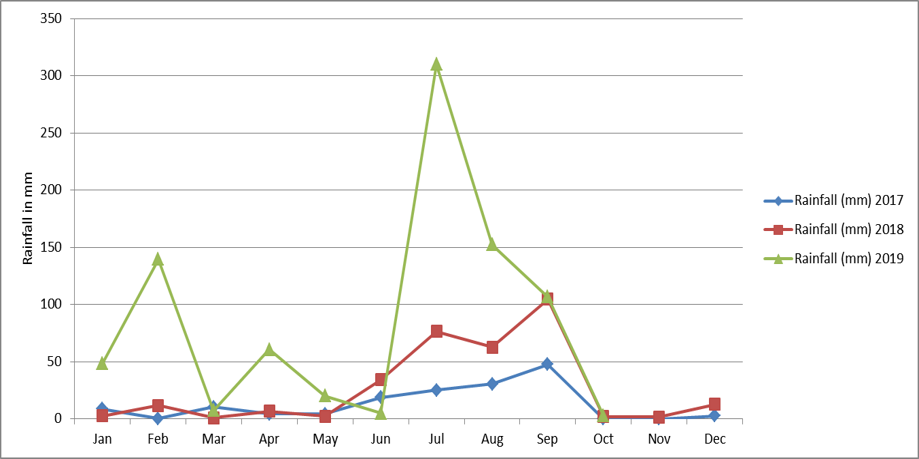
The graphical representation below is the temperature data of Panipat predicted for this Kharif season 2019. For Kharif 2019, there is a notable increase in temperature upto to 2°C as compared to year 2017 and 2018. The maximum temperature in the district is higher than 40 °C is analyzed in 2019. The graph compares the temperature condition for the previous 2 years i.e. 2017 and 2018 followed by 2019.
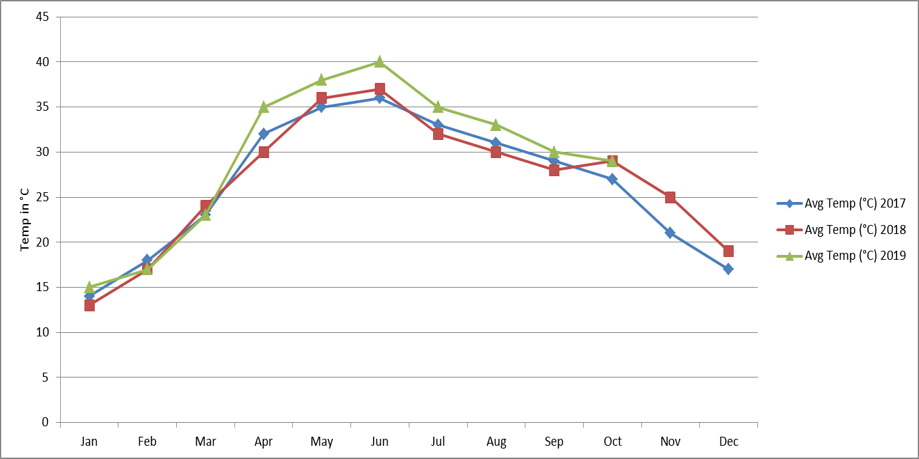
The map below depicts an overall increase in rainfall pattern of the country. India Meteorological Department has recorded surplus precipitation in the state. Rainfall is more than 30 cm in Haryana, production of paddy has been improved with considerable growth.
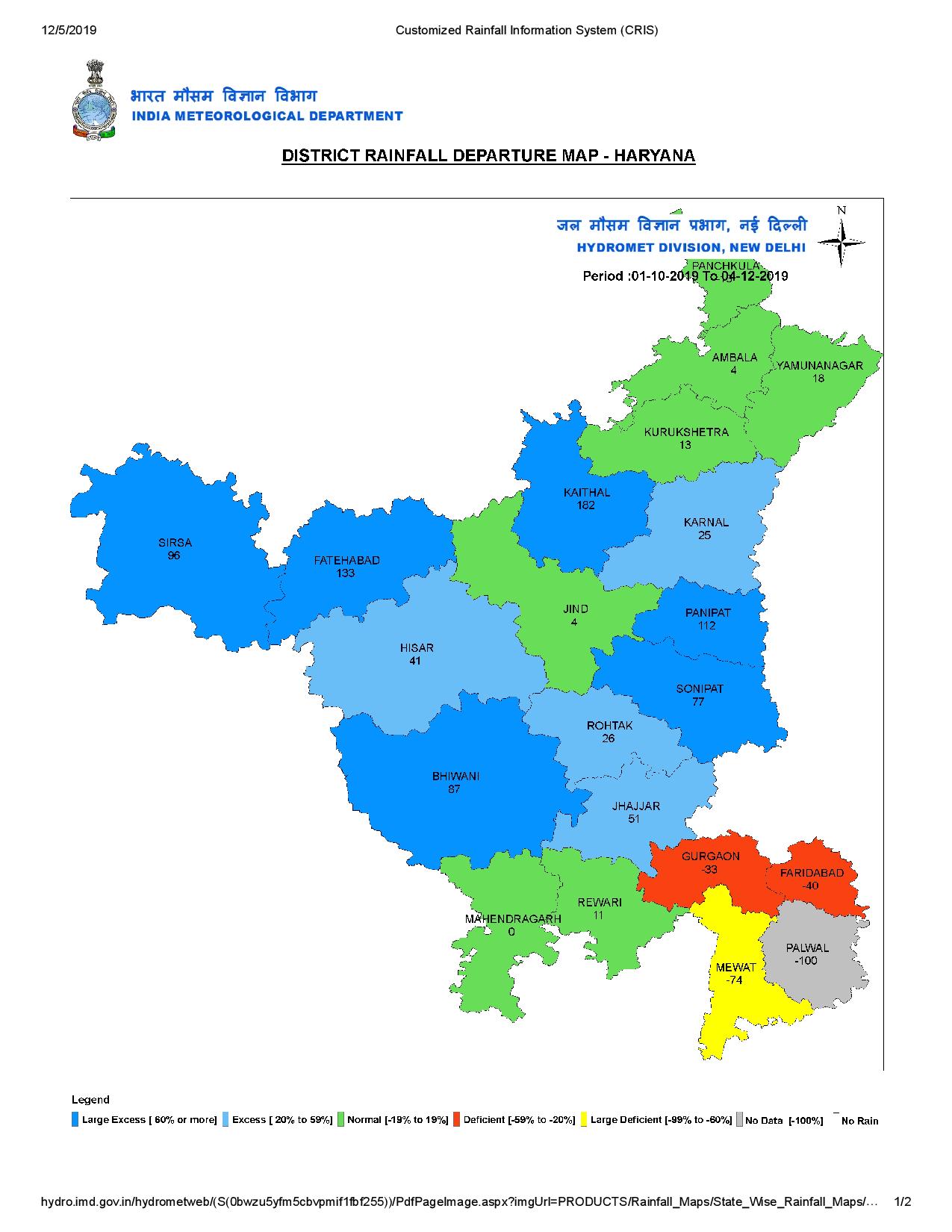
Results
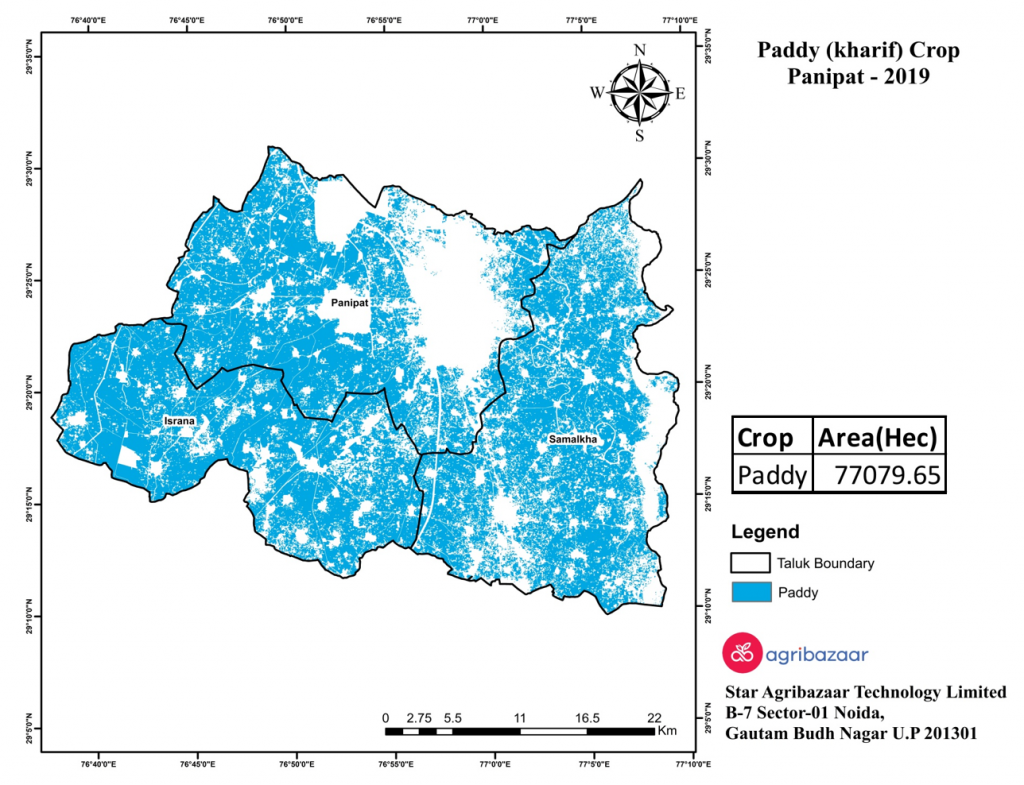
- Crop Production: As per the crop assessment in the Panipat district, paddy crop experiences the highest production in Panipat i.e. 66344 tons followed by 66268 tons in Samalkha and 64581 tons in Israna.

- Crop Variation: The crop acreage in Kharif season 2019 is expecting paddy to be sown the highest in Samalkha i.e. 26409 ha. After Samalkha, the second highest acreage is predicted to be in Panipat at 25939 ha followed by Israna at 24732 ha.
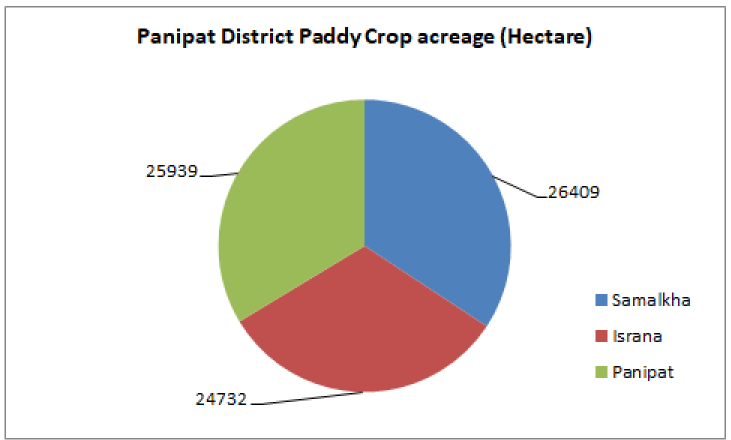
- Yield Estimation (Taluk-wise): The image below represents the graphical representation of paddy yields estimated in this season in Panipat. The predicted assessments evaluate that paddy crop of moderate quality will be the highest yield this Kharif season in Samalkha taluka of Panipat district.
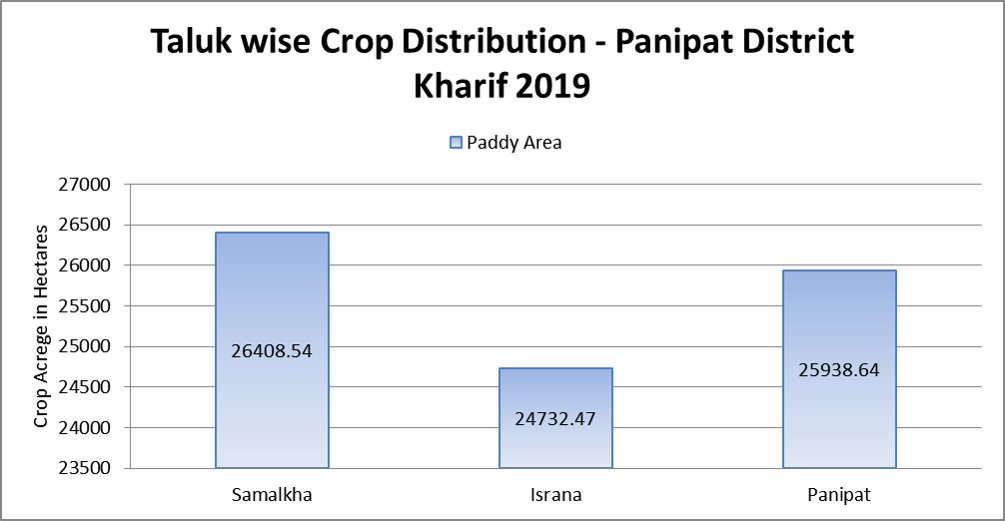
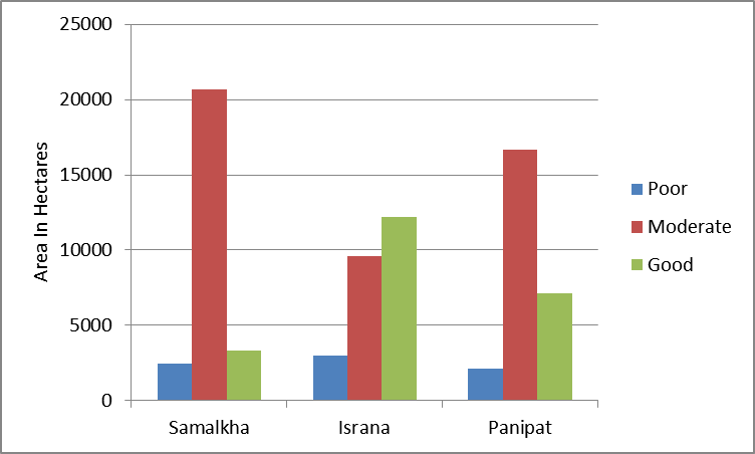
Crop health map of Panipat, Haryana Kharif crop 2019
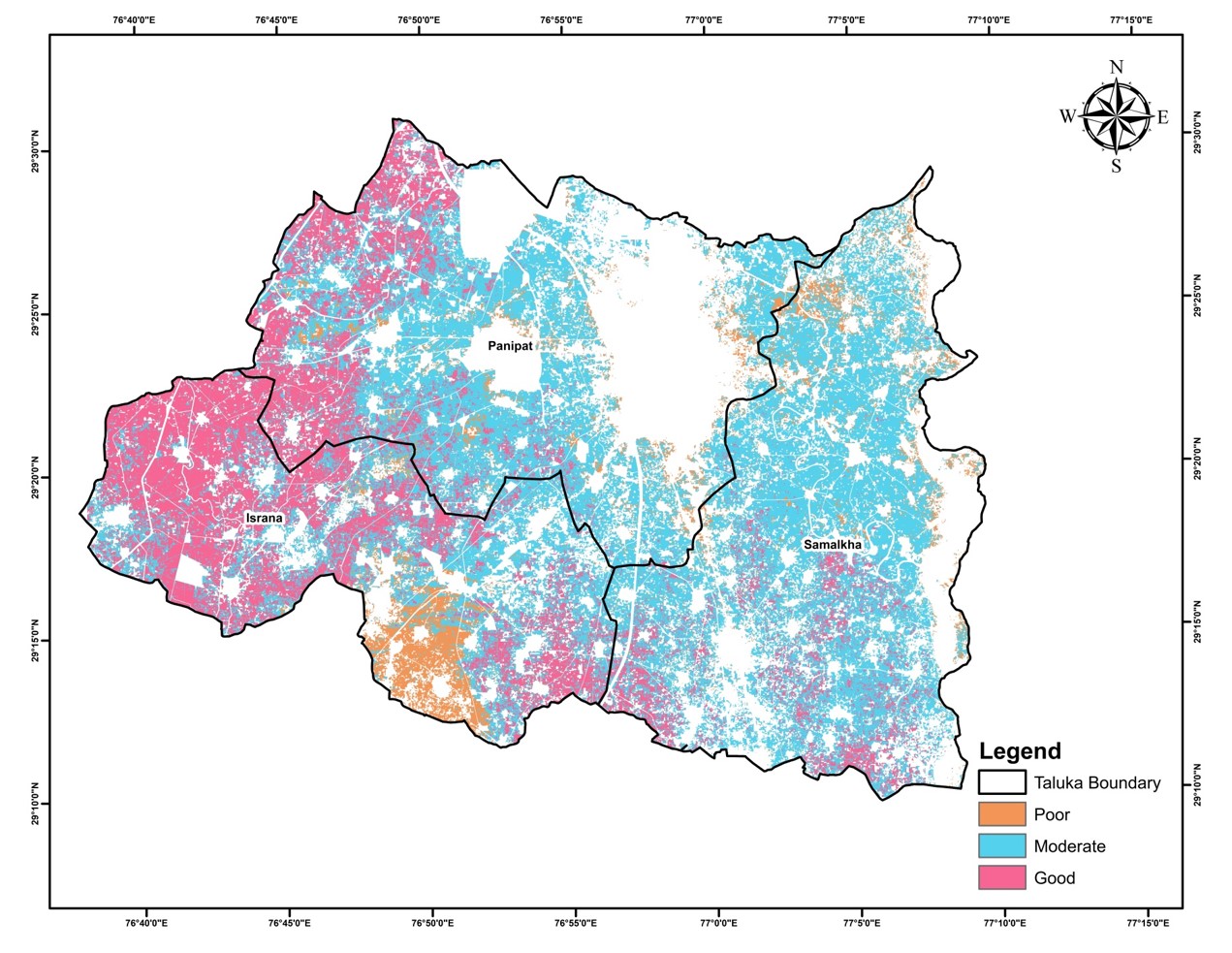
Conclusion
According to the estimated data, paddy production has been predicted to the highest in Panipat taluk with 66344 tons in the district while area-wise it is Samalkha at 26409 ha. However, Israna has been estimated to produce the lowest quantity in paddy production and the lowest acreage being 64581 tons and 24732 ha, respectively.
Conclusively, amongst the poor, moderate and good quality of paddy yield, good paddy crop is highest sown and moderate-quality is the highest grown in the district. The productivity for good paddy crop has been the highest being 2679 kg/ha whereas the acreage is the maximum for moderate paddy crop at 34056 ha.



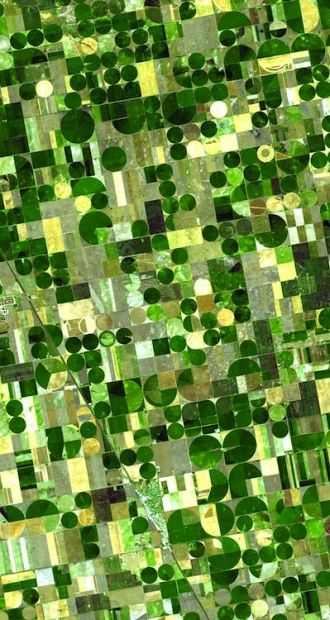

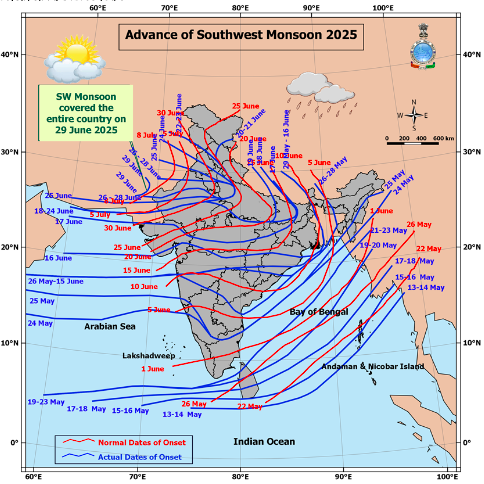
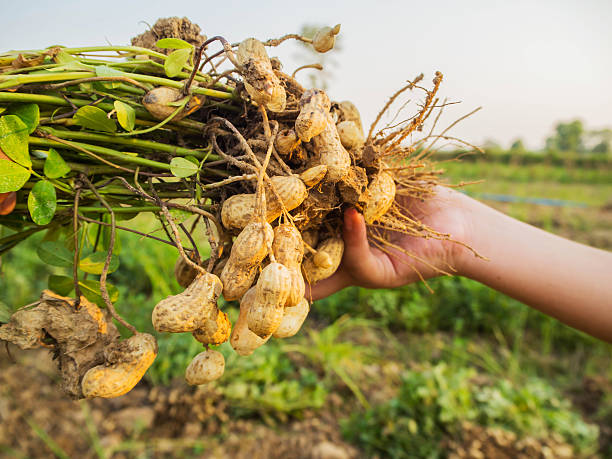
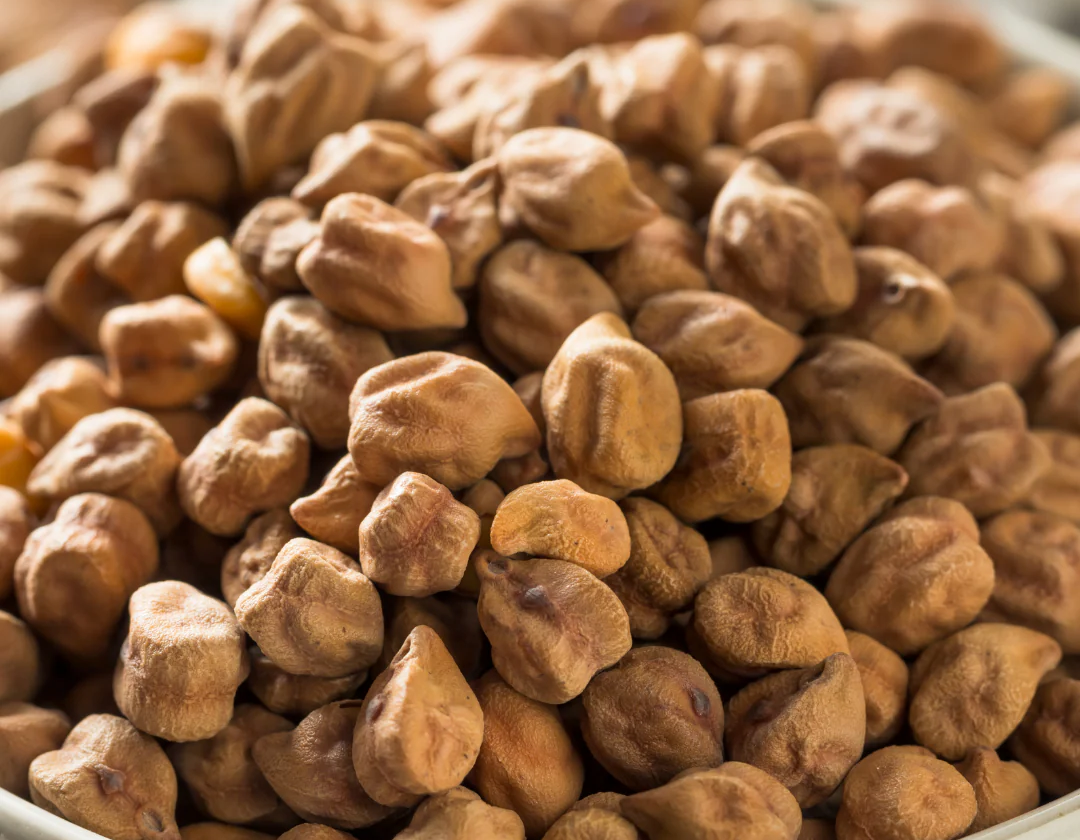
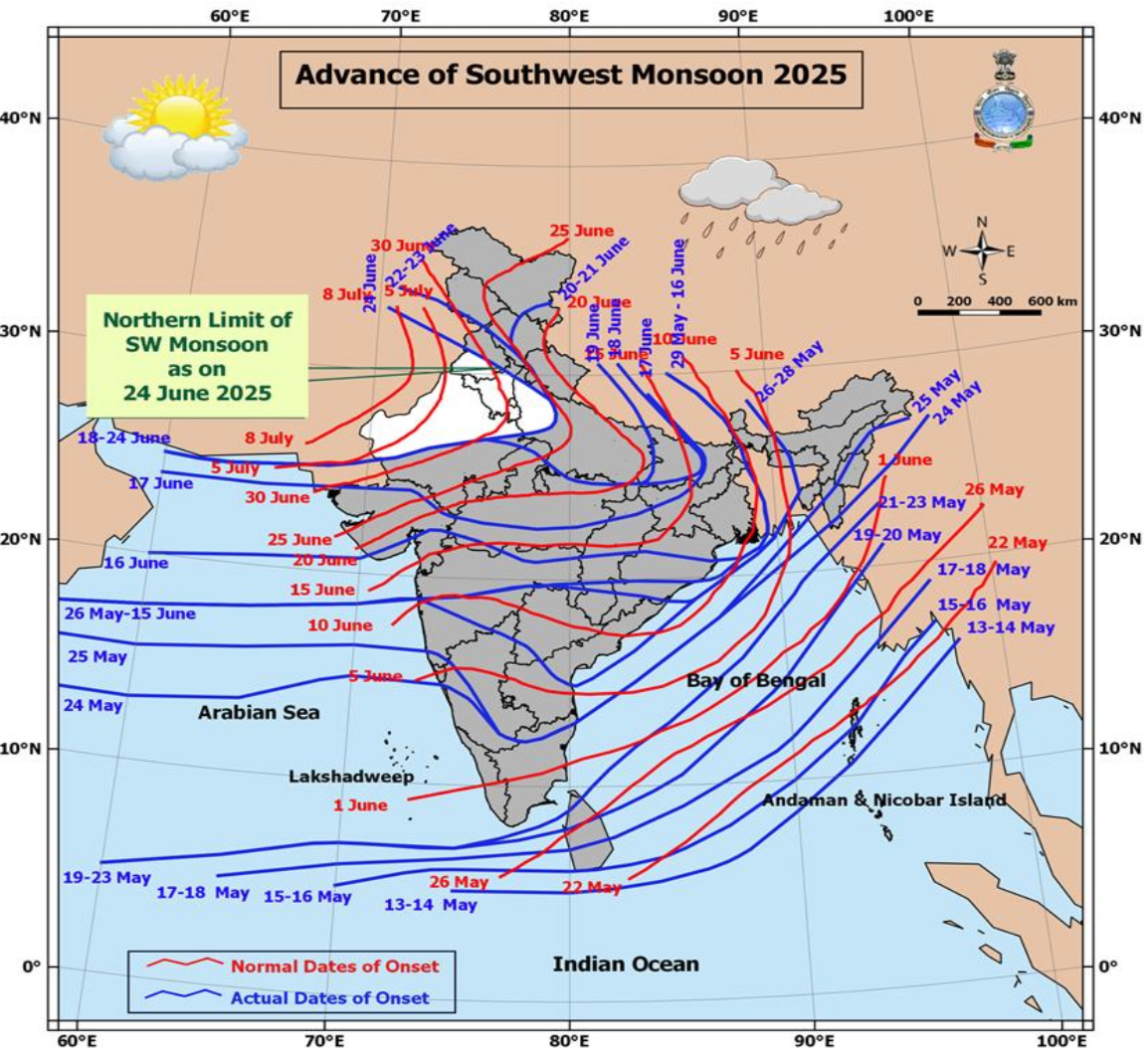

 Connect With Us
Connect With Us